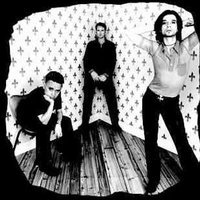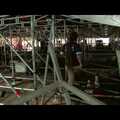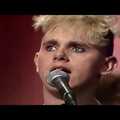Daniel Miller is the founder of Mute, launched in 1978 with his own 7” single – ‘Warm Leatherette’ under the name The Normal.
Daniel’s recent DJing was inspired by an invitation to perform at a Sandwell District event at Berghain. There he caught the bug to play again and since has been playing regular techno sets worldwide including Sonar, ENTER at Space in Ibiza, ADE in Amsterdam, IMS at Ibiza, Electron festival, LEAF festival in London as well as at Culture Box in Copenhagen, Bootleg in Tel Aviv and many others
Now, Daniel Miller makes his headlining debut at Egg London Birthday Part II with fellow techno legends, Green Velvet, Enrico Sangiuliano, Tobi Neumann and Alex Bau, joined by Jay Shepheard, Margot, Mark Moore (S-Express), The Nextmen and the Egg residents across three floors on Saturday, May 6th.
“…it was the do it yourself ethos of punk that inspired me to start putting out records.”
So how did you get into DJing?
I started DJing in the early ‘70s playing pop and chart stuff on 7” vinyl in a holiday resort – everything from Abba to Status Quo. I really enjoyed it but after two years it came to an end.
Fast forward to around 10 years ago, around 2007. I had been going to the Sonar Festival invited me to do a Sonar Lab, where record labels play the music from the label. I did it, but rather than play track by track, I decided to do it with locked grooves of many of the Mute artists’ tracks, so they all played in time with each other.
A few years later Regis, a techno DJ doing a project called the Sandwell District was doing a party at Berghain and said “why don’t you come and DJ” at this event. Well, that’s like playing your first football match at Wembley … He enthusiastically kept saying I could do the opening set, so I did and I really, really enjoyed myself. Now, I couldn’t not do it – it’s a huge part of my life and so much fun.
It all snowballed from there really…Now I have an agent [Suzana Gostimirovic] and I average around 30 or so gigs a year. Not exactly pro DJ level, but enough for me.
For people that haven’t heard you play before, how would you describe your sound?
I play contemporary techno – techno of various kinds, but not house and definitely not ‘80s music which some people expect me to play. I love techno and you can do a lot with it with the digital technology available today. It gives it almost live performance possibilities, which I find very exciting.
What kind of DJ set up do you use and how do you find it?
I use Traktor on my laptop, a Traktor S5 controller and a separate Tractor F1 controller, which I use to control the sequence within Traktor
It depends on what space there is at the booth but I also use an i-Pad which I can sync to Traktor via Link. I can improvise – drop drums and cymbals in – with that. I’ve always got the 4 decks running too as it keeps things interesting.
I enjoy DJing and it’s the closest I’m going to get to being a live musician. I like connecting with people through music and going on a journey with them.
So how did you come you first come to Berlin and is your love affair with the city and its clubs still ongoing and what makes it so special?
I’ve been coming to Berlin since the early ‘80s to record with bands on the Mute Records roster such as Depeche Mode, who worked a lot at the legendary Hansa studio [where David Bowie recorded ‘Heroes’ and “The Idiot” with Iggy Pop]. I got to know the city quite well and some of its more unusual inhabitants. When the wall came down in 1989 there was an explosion of underground clubs, warehouses, and all sorts of happenings. We were running the Novamute label by then – which we’re about to relaunch – and we started working closely with the guys from the legendary Tresor club including its founder Dimitri Hegemann. At that time Berlin was the centre of the world for techno and electronic music and I started meeting many of the leading electronic musicians including Richie Hawtin, who I first met there.
As I was going to the city a lot I decided to get a place, so I go to Berlin most weekends. I still go out in Berlin and I feel more comfortable going out there as I’ve got older. I don’t feel out of place in the clubs, I feel at home. Berlin’s had such a long history of underground culture and there’s a unique feeling of freedom. In Berlin you don’t have to have a proper job, you don’t have to grow up or to be conventional and people here carry on in this way all their lives, which is very different to the UK.
In terms of the clubs I still love Berghain, it retains a lot of its original spirit. I also love playing at Sisyphos, which has an anarcho squat atmosphere, helped by its old factory setting and it also has a younger crowd. Both clubs have their own unique setting and vibe.
Berlin is a big Western European city and it’s probaby the least expensive but like every big city, gentrification is spreading. When the wall came down it changed hugely but some parts of it are still untouched and there’s a lot of room to move around. It’s the physical size of London but with a third of the population, and so its doesn’t have the frenzy that London has.
Are you going to A&R the relaunched Novamute label and what artists have you already been showcased on the label? Can you also tell us about any forthcoming releases?
I was always involved in the A&R before but didn’t feel I was into the scene enough to lead it so Pepe [Jansz] and Seth [Hodder] took the helm. Now, because I’ve been out DJing I feel more competent leading the label going forward, and a few friends are also lending their ears and experience.
We had Richie Hawtin on the label as Plastikman, in a way he was already fully formed and a leading light within the techno scene through his Plus 8 label and releases but he felt it would be good to release music on a bigger, internationally based label known for music like Mute. I like how he’s never compromised musically with his sound. Dance music has changed completely and even though he’s a super star DJ he still plays underground techno music and doesn’t compromise on that front. We also had Luke Slater, Speedy J from The Netherlands, and Chris Liebing in the early days on the label. We were a 12” vinyl label that put out tunes from really good people that grew into leading names on the scene.
There’s nothing confirmed release wise for Novamute right now… we’re talking to a lot of people and it’ll very much be in the spirit of a pure techno label it always was.
Do you DJ in London often and are you looking forward to playing at the Egg London Birthday Part II on Saturday May 6th?
I don’t play very often in London or in the UK come to that but I’ve had shows at Village Underground and Plastic People. I’ve never played at Egg before but of course it’s legendary and I’m really looking forward to seeing Green Velvet – he’s incredible. Tobi Neumann is another legend and of course there’s also Alex Bau on the line up and Mark Moore from S’EXPRESS who used to be on our label Rhythm King.
How do you think club culture has changed through the decades and how do you compare the parties back then to the present?
I’m not really an avid clubber and I don’t go out every weekend – my going out is dependent on which city I’m in. With techno culture the spirit seems unchanged in many ways since it started, and that’s what keeps it fresh and exciting. Richie Hawtin invited Seth and I to DJ at his ENTER. parties in Ibiza. I hadn’t been to the island before, we did it for 3 or 4 years, and had a good time. Ibiza’s not really for me though, it’s too commercial and I’m also more into partying than the ‘getting out of it’ type scenes.
That’s what makes Berlin so special. Clubs in Berlin have a different pace and are more civilised because there’s no closing time. People are more relaxed but still really go for it across the 72-hour weekend. In other countries like Britain where there’s a tradition of pub culture with its restricted and limited opening and closing hours and people sometimes seem to be on a mission to loose it as much and as quickly as possible and sometimes its a bit of a crazy vibe.
Which DJs and Producers are currently inspiring you?
There are some great people out there, I’m a fan of Terence Fixmer, German producer Roland M Dill, Rødhåd, the pretty dark sound of Truncate, Recondite, Nina Kraviz and many more.
As a child/teenager growing up in London what were the early influencers on your journey into the music scene?
I grew up in Golders Green in North London in the ‘60s and was inspired by bands like the Beatles, the Rolling Stones, The Who, the Beach Boys. I was obsessed with music from a young age and couldn’t get enough of it.
Then in the ‘70s I got into experimental music, bands like Can, Neu! and Kraftwerk who were making inspiring electronic music. Then punk came along and changed everything. It inspired me more from a societal point of view and also it gave me the impetus and momentum to go on and put out records.
How did you listen to and find/collect your music and meet people into electronic music then?
Going through records in record shops, and of course there was the legendary DJ John Peel on Radio 1 playing all kinds of interesting music. I also had a friend who worked in imports for one of the early Virgin Record stores in Soho and I went there every day as I was working round the corner as a film editor. At that time I didn’t know that many people into electronic music and I wasn’t really into the clubbing or the New Romantic thing. I did go to the Blitz one night though when an overseas friend who was visiting asked if we could go along despite my protests saying we probably won’t get in because of what we were wearing. I think it was Steve Strange on the door and obviously he said we couldn’t come in, but I could hear they were playing my record ‘Warm Leatherette” downstairs and somebody came out of the club and said ‘he made that record’ and so Steve let us in. I also used to go to Studio 21 in Oxford Street.
How did Mute Records come about or had you always wanted to run your own record label? What were your early highlights of the label?
As I said before it was the do it yourself ethos of punk that inspired me to start putting out records. The first single I made, The Normal ’Warm Leatherette/TVOD’ came out in 1978 [now considered a cult classic and made hugely popular by Grace Jones]. At that time I was meeting lots of people into electronic music including artists like Fad Gadget, so I started putting out his records and then met Depeche Mode, it was a very organic, friends discovering the same journey sort of thing. I’ve really enjoyed working and learning with these people over the years and feel really privileged to have released their music.
With Depeche Mode becoming commercially successful very quickly with worldwide hits and stadium tours it was unbelievable and things changed again in a different and interesting way. It meant dealing with things on a worldwide scale and I’m really proud of everything we’ve achieved together over the years.
I’m proud of all the artists I’ve worked with, it’s great to have an on-going creative relationship and friendship where you’ve shared so much history together.
What was it about electronic music and synths that excited you and can you describe how it was then?
I was part of the second generation of electronic music and synth fans inspired by the early experimental German groups. As soon as I heard electronic music it opened up a whole new world of sounds and possibilities that weren’t there before. In the mid ‘70s synthesisers were hugely expensive and out of reach to many but when Korg and Roland synths came on the scene, it made a huge difference and had a liberating effect for those wanting to make electronic music. Everyone was inspiring everyone else. I released my single, the Human League came out a week later with theirs, then you had Cabaret Voltaire, Throbbing Gristle, OMD, Soft Cell, Depeche Mode all working in a short space of time. It was a wave of music.
Sampling was the next sonic revolution in the early ‘80s and it became rapidly available through Japanese technology. Mute were there at the birth of sampling and our artists pushed it to the limit. Then, that brings up more new and interesting changes, all the legal stuff around sampling – well that’s a whole other conversation.
So what does the future hold for you?
I’m going to carry on DJing and remixing – I’ve done a few select mixes in recent years [artists such as VCMG, Vince Clarke and Martin Gore’s techno project]
You have a wealth of history in the electronic music scene and could you please try and recall 5 of your most stand out moments?
1. Aged 18, coming up with the idea to put out my own record and thinking that everything was possible.
2. In the early days of Mute Records when things started to really take off around bands like Yazoo and Depeche Mode. Interesting things would be happening and we were busy keeping up with the global demand for the music. Physically it was crazy trying to press enough records every day to supply the shops – we were shipping around 70,000 or so a week and we weren’t even in the Top 10 UK national chart. It was a huge task daily and a huge learning experience, crossing new bridges each day. There were quite a few years of this…
3. Seeing Depeche Mode play the Rosebowl Stadium in Pasadena for the first time in 1988.
There were around 800,000 people there and it was just such an incredible experience and feeling – seeing their music appreciated on this scale.
4. Travelling to North Korea with Laibach for the first ever rock show by a western artist in the country, 2015
This was an incredible experience and not scary, since you ask. Laibach are an experimental band from Yugoslavia, and it was incredible to witness 2,000 people in a concert hall experience something they would have never heard the like of before. Hugely memorable.
5. DJing at Berghain
It’s very special for me to play here and it’s defined a lot of my life over the last five to six years.

6 May | Egg London Birthday Weekend Part II | Tickets | Egg London



